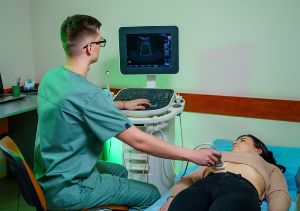4 FAQ About Ovarian Cancer

While ovarian cancer affects approximately 1 in 78 women and typically occurs later in life, knowing the signs at any age can lead to an early diagnosis and an improved prognosis. However, since many early symptoms are either mild or similar to other less-serious conditions, it can be challenging to make an accurate diagnosis. Here's what you should know about the risk, symptoms, and treatment of this disease.
What to Know About Ovarian Cancer
Who is at risk of ovarian cancer?
Anyone with ovaries can develop ovarian cancer, but there are some who are at a higher risk than others. A family history of ovarian, breast, or colorectal cancer can increase your risk. Other risk factors include a genetic predisposition, the use of hormone replacement therapy after menopause, having children after you turn 35, or never carrying a pregnancy to term. While these factors do not mean you will get the disease, there is a higher chance of it developing.
What are the symptoms?
In the early stages of ovarian cancer, it is easy to mistake symptoms for something less serious. However, you should be cautious and talk to your doctor if you experience:
- Pelvic or abdominal pain, pressure, or bloating
- Difficulty eating or feeling full faster
- Frequent or heavy urge to urinate
- Excessive or unexplained fatigue
- Gastrointestinal issues such as gas, nausea, or constipation
- Irregular or heavier than normal bleeding during periods
- Back pain
When caused by ovarian cancer, these symptoms tend to be more severe and often occur suddenly and frequently.
When should you get tested?

Ovarian cancer screening is not standard, but you should talk to your doctor if you are experiencing symptoms or have at least one risk factor. If they suspect the presence of cancer, you will need to consult an oncologist—a doctor who specializes in cancer. The first test ordered is typically an ultrasound, used to detect the presence of a tumor and determine if it is malignant or benign. Computed tomography (CT) scans can show if the cancer has spread to other areas of the body. However, a biopsy is the only way to conclusively diagnose ovarian cancer.
What are the treatment options?
Treatment of ovarian cancer depends on the type and stage. Surgery to remove the tumor is the most common approach, although additional treatments may be necessary. Chemotherapy can be used to shrink tumors prior to surgery or kill remaining cancer cells post-operation. Additionally, radiation therapy is sometimes used to treat areas where the cancer has spread.
If you are experiencing symptoms or risk factors of ovarian cancer, reach out to Tennessee Plateau Oncology – Dirk Davidson, M.D. This local cancer treatment center has served the Cumberland Plateau and surrounding areas for over 20 years. Their compassionate team offers cutting-edge treatments, personalized care, and emotional and educational support. Learn more about their services online and call (931) 484-7596 to schedule an appointment.
About the Business
Have a question? Ask the experts!
Send your question

